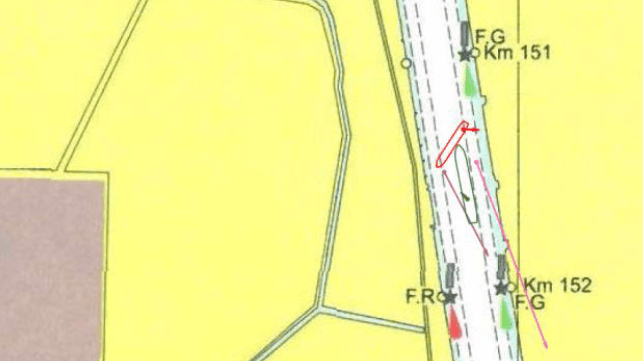Court Finds Three Vessels at Fault in Suez Pileup

An admiralty court in London has found fault with all three vessels involved in a collision on the Suez Canal in 2018, including a bulker that struck two vessels within the span of a single day.
On July 16, 2018, the bulker Panamax Alexander was moored in the southern stretch of the Suez Canal, near the 150-km milepost in one of the narrowest sections of the waterway. She had been damaged the day before in a collision and grounding with the bulker Sakizaya Kalon, and her rudder stock and propeller blades were bent. Due to the damage, she was awaiting a tow to the Great Bitter Lake. In the meantime, the crew had made fast to bollards on the side of the canal with six lines.
A northbound convoy approached at about 0800 hours, passing the Alexander on her outboard (port) side. The first two vessels passed without incident at about 0818-0830.
The 14,000 TEU container ship Falcon approached, and the Suez Canal pilots on her bridge remarked upon the narrow width of the waterway available to pass safely. They had the following conversation on the bridge, expressing concern that the Alexander would be torn loose from her moorings and that they had been set up for an unsafe passage (translated by the court from Arabic):
Pilot I: Dangerous, what’s happening is dangerous.
Pilot II: Of course.
Pilot I: You know, if only everything was done properly! I’m not afraid, it’s not my problem. I’m not the one in charge. But they leave everything aside and it’s only the pilots! 'The vessel gained shear force from you, you were sailing too fast, you turned early. We have the radar here showing everything.'
Pilot II: (later) No one must give instructions to vessels to pass like this, dangerous. If there is a little wind . . .
Despite their concerns, they did not share their apprehension with Falcon's master, nor did they slow Falcon down until a VTS operator called and asked them to reduce speed. At 0840, Falcon slipped by Alexander, close aboard and making about five knots over ground.
As the pilots correctly predicted, the Alexander was pulled away from the bank by Falcon's passing, and she surged aft. She parted her two stern lines and drifted out away from the bollards. Two nearby tugs did not stop her, and the crew's efforts to hold on with their remaining mooring lines were not successful. By 0851 Alexander's hull had fully spanned the width of the navigable channel (a preview of the Ever Given casualty).
The next ship in the convoy, the 9,000 TEU Orpheus, approached Alexander. Perceiving the danger, her pilots issued progressively more reactive engine orders, culminating in an order for crash astern at 0850:50. The maneuvers did not halt Orpheus' advance, and at 0852:30, the ship's bulbous bow penetrated Alexander's port side in way of the No. 5 hold and the No. 4 ballast tank. Orpheus' last engine order for full astern remained in effect, and it immediately pulled her bulbous bow back out.
Justice Andrew Baker concluded that there was no evidence that the crew of the Alexander had moved to double up the mooring lines when the convoy approached, and that this put Alexander at fault. Though there was no conventional mooring arrangement that would be ideal under the circumstances, "it was negligent of Alexander not to moor herself as securely as reasonably she could, by putting out the additional four lines required," he concluded.
Baker also found that Falcon came into the passing event at a speed one knot too fast, increasing interaction effects and raising the likelihood that Alexander would be affected. If she had been going 5.5 knots instead of 7.0 knots, the incident might not have happened, based on post-casualty modelling.
Likewise, he found that Orpheus was steaming along too swiftly as she approached the scene. Although she pulled back, she took a minute and a half to order astern propulsion, and at that point she was just a ship's length from the stricken Alexander.
"Orpheus was proceeding with significantly excessive speed, leaving it too late in her progress towards Alexander’s position before slowing for the pass," he found.
Baker apportioned the blame equally between Orpheus and Alexander, with a smaller share for Falcon (a ratio of 5:5:2, respectively).

that matters most
Get the latest maritime news delivered to your inbox daily.
But findings of fault aside, he noted a troubling pattern in master-pilot interactions on all the vessels concerned. "If what I saw in the evidence is typical of how Suez Canal pilots interact with the officers of the ships they are piloting through the Canal, and how at least on some ships those officers may be induced into passivity as a result, there is some cause for concern that there are other accidents waiting to happen in the Canal if unusual circumstances arise," he cautioned.
The narrow section of the Suez Canal in question is currently being widened, a response to the much more disruptive grounding of the boxship Ever Given.
